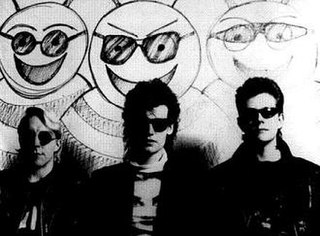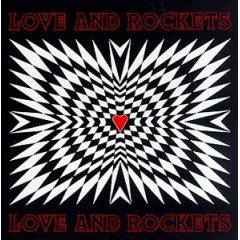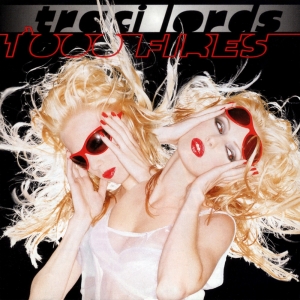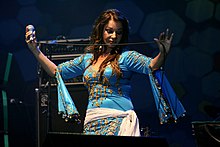
Bauhaus were an English rock band formed in Northampton in 1978. Known for their dark image and gloomy sound, Bauhaus are one of the pioneers of gothic rock, although they mixed many genres, including dub, glam rock, psychedelia, and funk. The group consisted of Daniel Ash, Peter Murphy, Kevin Haskins (drums) and David J (bass).

Tones on Tail were a British post-punk band formed in 1982, originally as a musical side project of Daniel Ash of the gothic rock group Bauhaus. Their music was described by one critic as "doom-and-dance-pop."

Daniel Gaston Ash is an English musician, songwriter and singer. He became prominent in the late 1970s as the guitarist for the iconic goth rock band Bauhaus, which spawned two related bands led by Ash: Tones on Tail and Love and Rockets. Recently, he reunited with bandmate Kevin Haskins to form Poptone, a retrospective of their respective careers, featuring Kevin's daughter Diva Dompe on bass. He has also recorded several solo albums. Several guitarists have listed Ash as an influence, including Dave Navarro of Jane's Addiction, Kim Thayil of Soundgarden, Hide of X Japan and John Frusciante of the Red Hot Chili Peppers.
Kevin Michael Dompe, born and best-known as Kevin Michael Haskins, is an English drummer, best known from the British rock group Bauhaus. He was also a member of Tones on Tail and Love and Rockets.
Love and Rockets are an English rock band formed in 1985 by former Bauhaus members Daniel Ash, David J and Kevin Haskins after that group split in 1983. Ash and Haskins had recorded and performed in another band, Tones on Tail, between 1982 and 1984.

Good God's Urge is the second studio album by American alternative rock band Porno for Pyros. It was released in 1996 on Warner Bros. It was the band's first album to feature bass guitarist Mike Watt, who assisted the band in finishing the album after Martyn LeNoble left before all his bass tracks had been completed. There were three singles released from the album.

David John Haskins, better known as David J, is a British alternative rock musician, producer, and writer. He is the bassist for the gothic rock band Bauhaus and for Love and Rockets.

"Ziggy Stardust" is a song written by the English singer-songwriter David Bowie for his 1972 album The Rise and Fall of Ziggy Stardust and the Spiders from Mars. Co-produced by Bowie and Ken Scott, he recorded it at Trident Studios in London in November 1971 with his backing band the Spiders from Mars—comprising Mick Ronson, Trevor Bolder and Mick Woodmansey. Lyrically, the song is about Ziggy Stardust, a bisexual alien rock star who acts as a messenger for extraterrestrial beings. The character was influenced by English singer Vince Taylor, as well as the Legendary Stardust Cowboy and Kansai Yamamoto. Although Ziggy is introduced earlier on the album, this song is its centrepiece, presenting the rise and fall of the star in a very human-like manner. Musically, it is a glam rock song, like its parent album, and is based around a Ronson guitar riff.

Seventh Dream of Teenage Heaven is the debut studio album by English rock band Love and Rockets. It was released on 11 October 1985, through record label Beggars Banquet. Seventh Dream was preceded by the non-album single "Ball of Confusion" on 17 May 1985, and the album's first proper single "If There's a Heaven Above" on 13 September 1985.

Express is the second studio album by English rock band Love and Rockets. It was released on 15 September 1986 on Beggars Banquet Records. An even greater departure from the band members' previous work as Bauhaus, the album's fusion of underground rock with pop stylings can be seen as an early example of alternative rock music, a genre that reached mainstream popularity in the early 1990s.

Mask is the second studio album by English gothic rock band Bauhaus. It was released on 16 October 1981 by record label Beggars Banquet.

Earth, Sun, Moon is the third studio album by English alternative rock band Love and Rockets, released in 1987 on Beggars Banquet.

Love and Rockets is the fourth studio album by English alternative rock band Love and Rockets; released in 1989 by Beggars Banquet Records on cassette, vinyl, and compact disc.

Sweet F.A. is the sixth studio album by English alternative rock band Love and Rockets, released in 1996 by American Recordings and Beggars Banquet.

Lift is the seventh and final studio album by English alternative rock band Love and Rockets, released in 1998 on Red Ant Records.

1000 Fires is the debut studio album by American singer and actress Traci Lords, released on February 28, 1995, by Radioactive Records. The album remains her only full-length music release to date. Lords started working on the album in April 1994, and collaborated with producers Juno Reactor, Mike Edwards and Babble. Executive produced by Gary Kurfirst, 1000 Fires is predominantly influenced by electronic music with elements of techno, trance and trip hop. Lyrically, it mostly focuses on dark themes, referring to Lords's past in the porn industry, revealing her rape experience on the song "Father's Field" or dealing with thoughts of suicide on "Fallen Angel".

Go Away White is the fifth and final studio album by English gothic rock band, Bauhaus and was internationally released on 3 March 2008 by record labels Cooking Vinyl in the UK and Bauhaus Music. It was the band's first album of new material since Burning from the Inside in 1983.

The discography of Bauhaus, a British gothic rock band, consists of five studio albums, four live albums, three compilation albums, four extended plays (EPs), eleven singles and three video albums. The band was formed in Northampton in 1978 by Daniel Ash (guitar), David J (bass), Kevin Haskins (drums) and Peter Murphy (vocals).

Pop is the only studio album by the English post-punk band Tones on Tail, a side project of the Bauhaus members Daniel Ash and Kevin Haskins, and the Bauhaus roadie Glenn Campling. It was released on 6 April 1984 by Beggars Banquet Records.
The Hot Place is an American rock band formed in Atlanta, Georgia in 2011. They have released one full-length album, The Language of Birds on No Big Wheel Records, which was recorded at Southern Tracks Recording. They have released 2 Singles/EP's, Petals of Ruin and A Second to Live.



















